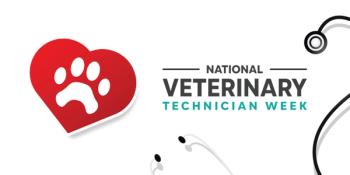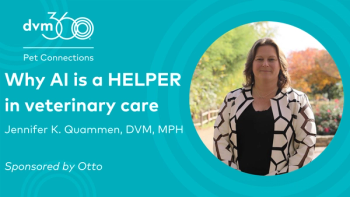
Practice in the Real World
The veterinarians in the area number almost 300, and there are 90 veterinary hospitals listed.
A Friday morning in December...
Dr. John Parker sits at his desk in Springfield, USA. John is in his sophomore year of real veterinary medicine after spending the vast majority of his life in school rooms pursuing an education. His formal education ended two years ago when he finished his orthopedic residency at the University of Florida.
John had always been good with his hands and as a teenager had spent several summers helping his uncle build houses in Ohio. During veterinary school this trait came in handy in junior surgery and his senior clinical training. This had ultimately led him to accept an internship at the Animal Medical Center in New York City. This, in turn, led to a residency in Florida and another four years of surgical training. The deferred loan account ballooned along the way and followed his progress in a long and whimsical tether. The balloon of debt followed effortlessly along until it finally came to roost in a nameless bank somewhere on the East Coast.
The real reason why veterinarians donâÂÂt refer more medical cases
To John, this silent ghost was now more like a lead anchor.
John has always been a right-brained creative type and was at first daunted and finally left frustrated by the veterinary community around him in Springfield. His private orthopedic practice is simply not as busy and as a profitable as he thought it would be. He had spent the first year in Springfield at an emergency hospital where he and an older veterinary dermatologist worked the day shift. He had thought that referrals would flood in and his dream would materialize.
In his mind, the oral agreement he had made with the emergency clinic director never materialized, and he had left last year embittered by the experience. John's 12-month-old practice is in a good location in a storefront near a busy intersection in a growing section of the city. In fact, he is busy at time but the expenses and the ghost in the eastern bank weigh him down.
John sits at his desk and ponders the local veterinary community. Springfield is now almost 1 million strong and is mostly a white-collar community with lots of government services. Springfield also has developed a strong modern industrial on the north side of town. The veterinarians in the area number almost 300 and there are 90 veterinary hospitals listed in the Yellow Pages—more than enough to support an orthopod.
John had sent a notice to all the hospitals in the area that he was available by referral and would be available and would keep the originating veterinarian in the loop. So, this June, John had noted that only 20 of those hospitals had referred a case to him with about eight hospitals referring the bulk of those. John pondered the other 70 practices and wondered what the problem was.
John sits at his desk and sees in his mind 70 veterinary hospitals doing their own orthopedic work and declares it "unethical". This morning John has "nothing to do". He has some surgeries in the afternoon but this morning he is at his desk.
"This certainly is an unethical situation," John thinks to himself. His musing runs the gamut of emotions from frustration to outright anger.
John sits at his desk.
Springfield, USA Friday night
Dr. Newton Rice laughed out loud as Nancy Stowers, DDS related another funny dental client story. Nancy and Newton were gabbing and yakking it up in Dr. Rice's expansive great room along with another 35 dentists and about a dozen more medical doctors from the area.
The kitchen and patio were spread with every morsel and drink that could be found by a favorite local catering service. Newton's wife flitted about serving and making sure that the gathering went smoothly. The house was aglow with the trappings of Christmas was now completely alive with gaiety and a feeling of goodwill.
Dr. Rice had thrown this gala every December for the past seven years as a Christmas party for the local dentists and a few selected medical docs that would or could refer Dr. Rice patients into his referral endodontic practice.
The annual event has grown over the years since Newton left his residency in Milwaukee. Newton is a gregarious and outgoing personality with a tribe of fiends in addition to his long list of referral clients.
In school Dr. Rice had shown unusual leadership skills and was asked immediately upon finishing his oral exams to sit on the state dental association board as its newest member. Dr. Rice ascended to the presidency and was then asked to serve on a committee in the national association of endodontics. After seven years, he had become so busy running his practice that he had to decline further work at the national level.
And not so incidentally his referral practice in endodontics had been closed to new referrals for about one year. There were other endodontists in the area, and they were now taking the spillover. Newton maintained a robust practice based on referrals from his friends in the community from all over a large regional area of the country. Dr. Rice has three partners and takes three months of vacation every year. Life is good.
What gives here?
John sits by his desk and demonizes his colleagues. Newton works the crowd and eventually has to close his practice to new clients.
To those within this profession, it would seem that I am comparing apples to oranges. However, regardless of profession or business, you have to have referrals and many have to be by "word of mouth".
Our profession, while stymied at times by harsh economic realities, still doesn't quite get it. Whether you are a specialist in a large city or a small town veterinarian, your ability to market yourself will be the defining issue in your economic and professional growth potential. The best way to do that is to find ways to enter the "river of life" around you and make yourself known.
Making yourself known in a media- driven world that seems to deliver on Andy Warhol's prophetic promise is becoming harder and harder. Maximum effort must be expended, regardless of background and talents.
Ethics â a narrow definition
It would appear that members of the profession have in print taken the rest of us to task for not referring enough clients upstream to the appropriate specialists (see
DVM Newsmagazine
, May 2003). They have equated this with a lack of ethics at the general practitioner level, and it leaves one with the impression that this single issue defines ethics in its whole for the profession.
This narrow confining definition of ethics simply leaves out the "ethical pipeline" many more pressing ethical issues of our era including "duties to others" and animal welfare to name two. This article goes on to state that veterinarians believe that there is finite income for each pet and therefore they will make less money if they refer. That is certainly a very broad brush with which to paint the profession and in fact the economic naivetéf most practitioners in general would seem to refute these broad assumptions.
I just don't think veterinarians think at that level. In fact, I would submit that many of our colleagues when they do refer do so for the wrong reasons including:
- Difficult and demanding clients (let them worry about her/him, etc.)
- Crutch syndrome: Low self-esteem generates immediate referral and support from specialists on cases that may in fact be best handled locally.
- Friday afternoon syndrome: Vet has learned that the degree that a case is challenging or interesting is superceded by the need to not be bothered treating and nursing a given case over the weekend.
Specialists certainly cannot demand (and most don't) that veterinarians that have spent a good portion of their lives educating themselves regress to the "Pen/Step"and Iodine" medicine of the 1950s so that specialists can manage all the challenging and difficult cases presented nationwide.
Non-healing wounds
On the other hand, we have had too many self-proclaimed specialists who in their ardor to practice those areas of medicine and surgery that appeal to them professionally stand in the way of board-certified specialists with proper training.
This group of self-proclaimed specialists is declining, but we still have many aggressive and entrepreneurial veterinarians doing procedures that are beyond their standard training and certainly not overseen by a body of peers. For the record, this group of veterinarians is the minority.
Greed?
The underlying drumbeat of some specialists is that veterinarians do not refer because of greed. Although there are exceptions, this is simply not common. Most veterinarians don't refer for other reasons. (See related sidebar, p. 32.)
Those veterinarians that overstep their bounds in general practice don't do it for money, but for pride. Some of this pride is well founded and healthy. However, to the extent that generalists do procedures "out of their league" is certainly detrimental to animal health and to the profession as a whole.
It should be noted that those that want to ply this trade in the rural areas like those of Wyoming and Idaho are grandfathered out of this discussion. It goes without saying that the best available medicine and surgery is often beyond the referral range of these practices and therefore the best available care resides in these local practices—period.
Key issues
Too often specialists even think of their colleagues as competitors—this leads nowhere. If specialists want to see more patients and improve the profession and their professionalism as a whole, they need to follow the lead of Newton Rice. Whatever it takes to meet the faces of the veterinarians in the trenches slugging it out with bleeding toenails and flying pungent packages of E. coli. — it must be done. This is not easy, but a little shoe leather and an easy handshake will go a long way in providing your specialty practice with plenty of referrals.
It really is a small profession, and it sure would be nice to bring back those old days when veterinarians knew each other on a first name basis.
Specialists that are on top of their game should also be looking for professional relationships with industry in order to provide workshops in their area for local practitioners. Here faceless professionals like John Parker, DVM can interact with colleagues and develop those important relationships that bond them to clients. Yes, I did say clients. Local veterinarians are your clients and the referral patients are their patients—not the other way around. Once we get that straight, then things will start to get straight. And hopefully John, you won't have to sit around your office much anymore.
Newsletter
From exam room tips to practice management insights, get trusted veterinary news delivered straight to your inbox—subscribe to dvm360.






